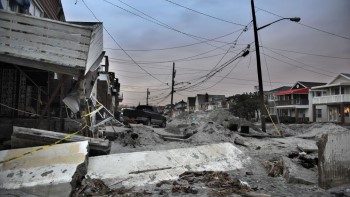Difference between Superstorm and Hurricane
Key Difference: The general definition of a superstorm is, ‘a large disruptive storm that can’t be categorized as a hurricane or a blizzard.’ Hurricanes can be defined as a rotating storm that has characteristics such as low-pressure center, a closed low-level atmospheric circulation, strong winds and a spiral thunderstorm with rains.
 Nature can be just as scary as it is beautiful and a natural phenomenon, no matter what it is called can cause a lot of devastation and destruction in its wake. We often hear terms such as cyclones, superstorms and hurricanes on weather reports but for the general public understanding the difference between these terms can often cause confusion. However, the difference can also help you survive when necessary. In this article, we will tackle the most common two meteorological phenomenon – superstorms and hurricanes.
Nature can be just as scary as it is beautiful and a natural phenomenon, no matter what it is called can cause a lot of devastation and destruction in its wake. We often hear terms such as cyclones, superstorms and hurricanes on weather reports but for the general public understanding the difference between these terms can often cause confusion. However, the difference can also help you survive when necessary. In this article, we will tackle the most common two meteorological phenomenon – superstorms and hurricanes.
The word ‘storm’ is commonly thrown around when there is heavy rainfall or snow, but the term ‘superstorms’ are reserved for more drastic situations. However, if you’d ask any meteorologist to define the term or the conditions under which the word ‘superstorm’ is used, you’d find that each one will give you a different answer. The reason for this is that there is no official definition for the word ‘superstorm’ and it is often used by each individual as they see fit.
The general definition of a superstorm is, ‘a large disruptive storm that can’t be categorized as a hurricane or a blizzard.’ It was coined recently and there are still disputes regarding its usefulness. The term can be distributed into two different climate systems – tropical and cold temperate. The terminology can be dated back to early 1990s, when it was used in phrases such as “perfect storm” or “storm of the century” to define large destructive storms that left an impact. After that, it became a common word for describing weather pattern that are as destructive as hurricanes and cyclones, but display cold-weather patterns.
On the other hand, hurricanes are simply another name for tropical cyclones, which is also known as other names such as typhoons, cyclonic storm, tropical depression or simply cyclones. The names differ depending on the location of occurrence, such as hurricanes occur in the Atlantic Ocean and northeastern Pacific Ocean, while typhoons occur in the northwestern Pacific Ocean and tropical cyclones occur south Pacific or Indian Ocean.
 Hurricanes can be defined as a rotating storm that has characteristics such as low-pressure center, a closed low-level atmospheric circulation, strong winds and a spiral thunderstorm with rains. Hurricanes are rated into 5 different categories based on their severity, these categories are determined by wind speed, where category 1 includes wind speeds of 74-95mph and category 5 includes wind speeds of over 157mph.
Hurricanes can be defined as a rotating storm that has characteristics such as low-pressure center, a closed low-level atmospheric circulation, strong winds and a spiral thunderstorm with rains. Hurricanes are rated into 5 different categories based on their severity, these categories are determined by wind speed, where category 1 includes wind speeds of 74-95mph and category 5 includes wind speeds of over 157mph.
Hurricanes and superstorms are commonly very similar and in many cases you’ll find that some hurricanes can become superstorms such as Hurricane Sandy, which originally started off as a hurricane, but due to picking up a colder temperate resulted it being called a superstorm rather than a hurricane when it hit land. The main distinguishing feature between hurricanes and superstorms are the temperate, where hurricanes are fueled by warm, moist air and superstorms are fueled by cold and dry air.
|
|
Superstorm |
Hurricane |
|
Meteorological Definition |
No official definition by the meteorological society |
A storm characterized with a low pressure center, closed low-level circulation, strong winds and spiral thunderstorms that bring rain |
|
Severity |
Mildly severe but has the ability to cause massive destruction |
Extremely destructive |
|
Location of formation |
Commonly forms outside of tropical conditions |
Forms in tropical locations |
|
Size |
Larger than tropical cyclones |
Smaller than tropical cyclones |
|
Wind Speeds |
Between 39 and 73 miles per hour |
More than 74 miles per hour |
|
Best Protection |
Remaining indoors, finding higher grounds, and possibly evacuation |
Evaucation |
Reference: Wikipedia (Superstorm, Tropical Cyclone), AJC, Newsmax, Stack Exchange Image Courtesy: greentechmedia.com, livescience.com









Add new comment